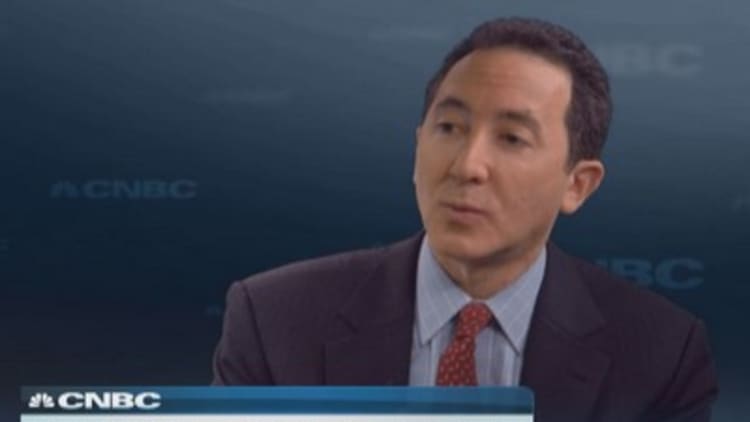The recent weak economic data from China "significantly increases" the risk of global deflation according to Societe Generale's uber-bearish strategist Albert Edwards, who argued that investors were ignoring the warning signs.
Edwards – who is known for his gloomy predictions about the global economy – said that China's first-quarter gross domestic product (GDP) data had been "virtually overlooked" by investors, but included important signs that declining prices were looming.
China's economy grew at an annualized 7.4 percent in the first quarter (Q1) of this year. This number was just above analyst expectations, but marked a slowdown from the 7.7 percent increase seen in the last quarter of 2013.
Read MoreAlbert Edwards: Markets face Freddy Krueger-like nightmare
"China's Q1 GDP was highly significant, not for the headline slowdown in growth… but because economy-wide inflation slumped further towards outright deflation," Edwards wrote.
He highlighted the country's GDP deflator – a broader measure of domestic price trends, including investment goods, housing and exports, as well as consumer goods and services - dropped by 1.4 percentage points to 0.4 percent year-on-year.
Fears of deflation have been mooted in the euro zone, where consumer price inflation fell to a 52-month low of 0.5 percent in March. By contrast, China's annual consumer inflation was 2.1 percent last month.
"(This) may be giving investors an overly reassuring impression of underlying deflationary pressures in the Chinese economy overall," Edwards wrote.
Economists are concerned by deflation because it can push down demand, with people holding off purchases in the hope of more price declines. This, in turn, can lead to lower production and an economic slump – or even a depression.
Japan, for instance, suffered deflation during its "lost decade" between 1991 and 2000, when companies cut prices to revive lackluster demand, which in turn hit businesses' revenue and had a knock-on effect on the economy.
Read MoreDeflation wars? Economists fear Japan-style lost decade
"Indeed, focusing on the consumer price index (CPI) in Japan, rather than the GDP deflator, would have underestimated the deflationary hurricane that was raging in Japan… Let us not make that mistake for China," Edwards added.
Risk of US deflation?
As the world's second-largest economy, the effects would be felt across the world if China slid into deflation – even in the U.S., Edwards warned.
"We have long banged the drum that deflationary developments in China would force renminbi devaluation and trigger outright deflation in the West," he said.

A slide in China's currency versus the dollar, for instance, would make Chinese products cheaper to import into the U.S. American producers might then cut prices to remain competitive and deflation could take hold.
Read MoreWhy Japan's economy is in better shape than China's
Not everyone is concerned about global deflationary pressures, however.
Indeed, some strategists worry that the U.S. labor market might be tighter than currently thought, meaning wage growth could potentially push America into an inflationary danger zone.
"Inflation pressures are beginning to build. They're not at alarming levels right now, as inflation build-up is a process, but it's something that the Federal Reserve should be paying attention to," Peter Boockvar, chief market analyst at the Lindsey Group, told CNBC earlier this month.
Furthermore, it's not the first time Edwards has made extremely bearish predictions on the global economy. In September 2012, he said the U.S. had already entered a recession and it wouldn't be long before the equity market reacted.
He also warned in July 2012 about an "ultimate" death cross for the S&P 500—where the 50-month moving average falls below the 200-month moving average. Since that call, the S&P has risen around 37 percent.


